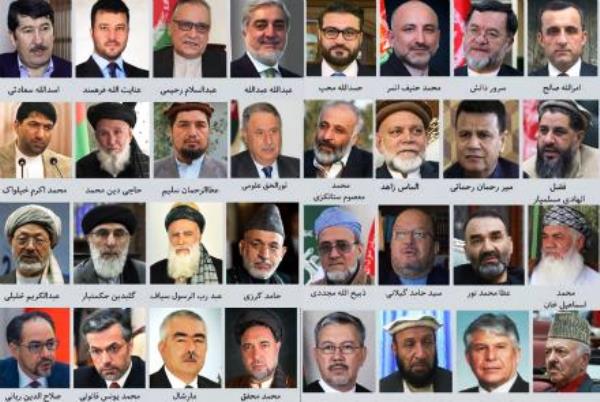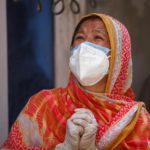The new member list of the High Council for National Reconciliation, announced in a decree by President Ghani on Saturday, has been met with mixed reactions by major political parties and politicians. Some on the list, such as former president Hamid Karzai, have rejected their membership, while others have welcomed it.
The council has 10 members in leadership positions, nine women members, nine high-ranking government officials, and 19 who are an assortment of political figures and former mujahideen leaders.
Based on the Ghani-Abdullah political agreement signed in May, the High Council for National Reconciliation is an independent council, but its members are officially approved by presidential decree, an aspect of the deal which is criticised by politicians.
According to Ghani’s decree, Abdullah Abdullah, Abdul Salam Rahimi, Enayatullah Farahmand, Assadullah Saadati, Zuhra Mutahari, Atta-Ur-Rahman Salim, Haji Din Mohammad, Mohammad Akram Khpulwak, Mohammad Masoom Stanekzai and Noor-Ul-Haq Olumi are members of the leadership of the council.
This means that Abdullah has seven deputies, while based on the political agreement he should have six deputies. These include his two running mates in the 2019 presidential election.
Former president Hamid Karzai in a statement said he will continue his efforts for peace, but rejected his membership in the council, saying he would serve in no government institution.
Hizb-e-Islami, led by Gulbuddin Hekmatyar, called the membership of mujahideen and political leaders in the council symbolic and ineffective.
“The formation of a powerful high council that does not have the nature of a government mission is the main principle for effective intra-Afghan negotiations,” said Hafiz-Ur-Rahman Naqi, the deputy head of Hizb-e-Islami.
Salahuddin Rabbani, former minister of foreign affairs, is also included in the 46-member list.
Rabbani in a statement said that he was not consulted about the inclusion of his name on the list; therefore, he rejects his membership.
The decision also faced criticism by the Afghanistan Independent Human Rights Commission.
“No woman is leading any structure of peace that has been created by the Islamic Republic of Afghanistan. This is very concerning for me,” chairperson of the commission Shahrzad Akbar said.
Former mujahideen leader Mohammad Ismail Khan, whose name is also on the list, said he has some considerations about the position of some figures in the council.
“The list that was announced includes more important and more influential figures than in the past, but the important matter is the leadership of the High Council for National Reconciliation,” he said. “They have included big names on the list who cannot be there as members (of the council).
Mohammad Karim Khalili, former head of the High Peace Council and a close aide to Abdullah, called this a list of “Ghani’s favorites.”
“Mr. President, you can never create unity and solidarity on this side of society when your thoughts are all focused on the State Builder team (Ghani’s presidential campaign),” Khalili said.
Second Vice President Sarwar Danesh, meanwhile, called the council inclusive and an important step for peace in the country.
“Let’s see whether the council will start its work, considering the difference among those whose names have been added (to the list),” Danesh said.
Political and National Figures as Members
The members of the council announced in the decree are former president Hamid Karzai, former mujahideen leader Abdul Rab Rasul Sayyaf, Hizb-e-Islami leader Gulbuddin Hekmatyar, former vice president Mohammad Karim Khalili, former deputy chief executive Mohammad Mohaqiq, former vice president Marshal Abdul Rashid Dostum, former vice president Mohammad Yunus Qanooni, former foreign minister Salahuddin Rabbani, former mujahideen leader and former minister of energy and water Mohammad Ismalil Khan, former Balkh governor and CEO of Jamiat-e-Islami Atta Mohammad Noor, head of Maaz-e-Milli party Sayed Hamid Gailani, Zabihullah Mujaddedi, political and religious figure Sayed Mansoor Nadery, political and religious figure Enayatullah Shahrani, former deputy chief executive and political figure Engineer Mohammad Khan, head of Afghanistan’s Ulema Council, former head of the Administrative Office of the President Sadiq Modabir, Mohammad Ismail Ghazanfar and Mawlawi Khodaidad Saleh.
High-Ranking Officials as Members
According to the decree, members of the council from the government are First Vice President Amrullah Saleh, Second Vice President Mohammad Sarwar Danesh, Acting Foreign Minister Mohammad Haneef Atmar, National Security Advisor Hamdullah Mohib, Meshrano Jirga Speaker Fazl Hadi Muslimyar, Wolesi Jirga Speaker Mir Rahman Rahmani, presidential adviser Almas Zahid, state minister for peace affairs (that has not been appointed so far) and presidential advisor Mawlawi Jora Tahiri.
Women Members
Women members of the council are civil society activist Safia Sediqqi, former MP Najiba Ayubi, a member of the Afghan Women’s Network Mari Akrami, civil society activist Zia Gul Rezaee, member of the Independent Administrative Reform and Civil Service Commission Alia Yulmaz, former higher education minister Farida Mohmand, chairperson of medical council of Afghanistan Nasrin Oryakhil and civil society activist Zarqa Yaftali.
Leadership Members
According to the decree, the leadership members of the council are Abdullah Abdullah, head of the High Council for National Reconciliation, Abdul Salam Rahimi deputy head of the council, Enayatullah Farahmand deputy head of the council, Asadullah Saadati deputy head of the council, Zuhra Mutahari former deputy governor of Paktia, member of Afghanistan Ulema Council Atta-Ur-Rahman Salim, head of Hizb-e-Islami Nawin Din Mohammad, political figure Akram Khpulwak, head of negotiation team Mohammad Masoom Stanekzai, and special presidential envoy Noor-Ul-Haq Olumi.
“Some of those who had independent voices are not included on this list,” former NDS chief Rahmatullah Nabil said.
“This list is neither accepted by the youth of Afghanistan nor by Afghan women,” said Jafar Mahdawi, head of Hizb-e-Millat-e-Afghanistan.













